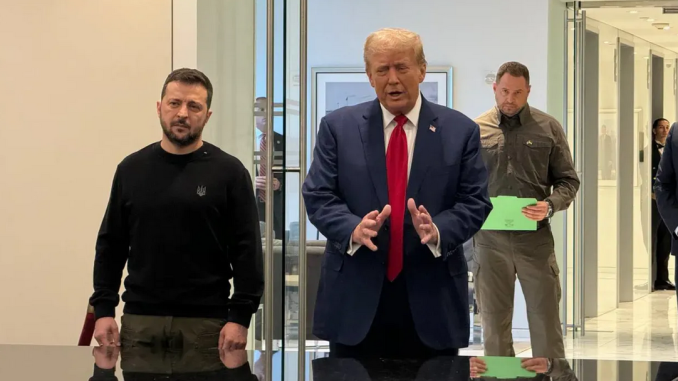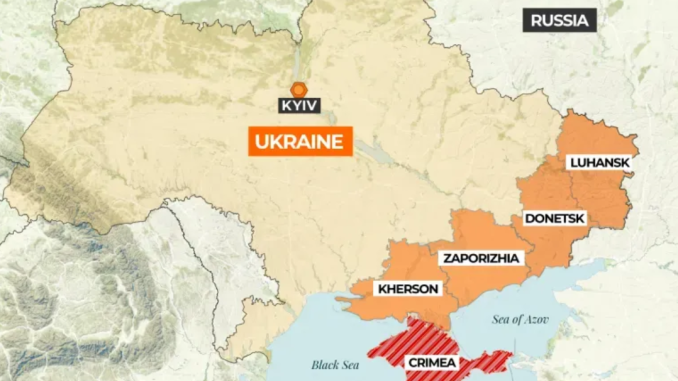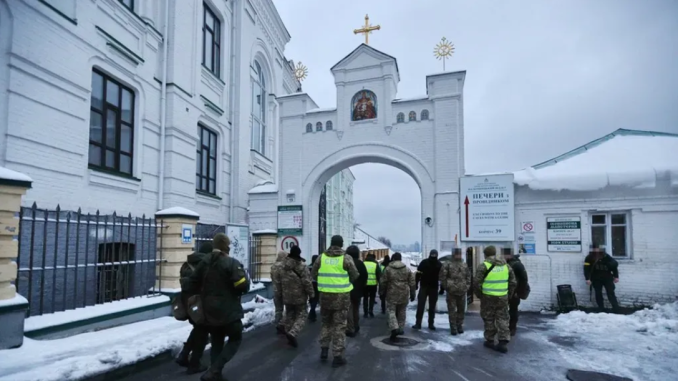Peloni: A key want from Russia is to finally have a pan-European security arrangement which includes rather than isolates Russia. The problem with this is, and always has been, that NATO as the existing European security arrangement, is a US dominated organization, and US fears of Russia having more relevance than America in a European security arrangement has maintained this anti-Soviet organization in place some thirty years after the Russians themselves laid to rest the Soviet Union. It will be interesting to see how Trump squares this knot, but there is an ever increasing benefit to be had with strengthening, or at least creating, ties with Russia rather than continuing to press them further into China’s pocket, so to speak.
Trump may be more than willing to trade with the Russians on NATO in exchange for less punitive demands on Ukraine.
Stephen Bryen | Weapons & Strategy | Nov 07, 2024
 Mr. Zelensky (left) and Mr. Trump in New York at Trump Tower.7
Mr. Zelensky (left) and Mr. Trump in New York at Trump Tower.7
There are a growing number of reports on what the forthcoming Trump administration will do domestically and what policy approach it will have globally. There have been a number of comments, some of them coming from administration wannabes, on what President-elect Trump should do about Ukraine.
Trump promised during the campaign that he would end the war in Ukraine pretty quickly once he took office. He has hinted he would do this by engaging Russian President Putin and Ukrainian President Zelensky. Beyond that we have a guessing game.
The wannabes are throwing around contradictory ideas. Some want a ceasefire deal. Others talk about a cordon sanitaire and having it enforced by the Europeans. Still others concede the need to “award” Russia and let them hold onto captured territory. And some say that part of a deal might be to stop Ukrainian NATO membership for a period of time, perhaps 20 years.
No one seems to have any idea what the Russians want, or so it seems.
Trump is a savvy negotiator. He will want to know what his opponent wants and he will try and find ways either to accommodate or to leverage him.
Russia has been fairly clear about some of what it wants, but not everything.
What follows is my understanding of Russia’s objectives in Ukraine. Explaining them does not mean that I agree with them. Nor does it mean that all are of equal importance to Russia’s leaders.
Russia will insist on keeping the territories that it has previously annexed. Various solutions, a cease fire, a buffer zone, or some kind of territorial freeze will not satisfy Russia’s leaders. Russia will demand formal recognition of its earlier annexations and seek to establish firm borders for these territories. This means that any negotiation about the annexed territories is mostly a matter of maps.
It is important to note that not only Ukraine, but also its NATO supporters will need to agree about the annexed territories. It is unlikely Russia would accept a deal strictly with Ukraine’s government, since governments can change.

There is some room for maneuver about territory, but not much, such as transit of people and goods, distribution of electrical power, oil and gas pipelines etc.
Another related issue is family reunification and various claims and counterclaims for destroyed property that have to be sorted.
Russia will also want guarantees of Russian language and culture, as well as protection of the Russian Orthodox church, all of which are under attack by Ukraine. Russia has insisted that it entered the war to protect Russian people living in Ukraine. Given the importance of the Orthodox Church in Russia and its influence on Putin and others, Putin cannot walk away accepting a deal that leaves Russian-speakers unprotected and vulnerable, churches occupied by the enemy, or other forms of official discrimination.

At the governmental level, Russia will want a more friendly government in Kiev. What started this mess in the first place was turning a somewhat Russia-friendly Kiev government into a Russia-enemy government, and by replacing Russian trade and security arrangements with the EU and NATO. It is doubtful Russia will agree to Ukraine’s EU membership, and certainly will demand that NATO get out of Ukraine. It also means that Russia will want Ukraine largely demilitarized, probably by limiting the number of heavy armaments such as tanks, infantry fighting machines, artillery, drones (which the Russians may demand be removed altogether), and air defenses reduced or permitted only to cover certain areas.
Russia will be against any further deliveries of weapons to Ukraine and it will ask for all advisors and all mercenaries including contractors, to quit the country.
Beyond Ukraine, Russia will ask for lifting all sanctions. In exchange Russia will facilitate Ukrainian trade and commerce.
There also are issues about the future of the Black Sea that could be included in a negotiation, and issues about long range weapons in some NATO countries and in Russia. The big issue is lowering the nuclear threshold. Whether this can be done in connection with a Ukraine negotiation is not clear.
For Europe the big thing is to lower the potential threat profile Europeans (and Americans) think Russia poses to European security. Europe fears that Russia, now with a big and experienced army, will launch attacks in the Baltic States, or against Poland or Romania. Europe’s attempts to strengthen its defense capabilities is a long term process, and there is no assurance it will ever happen. As the collapse of the German coalition appears to demonstrate, some European countries lack resources to take care of their own defense, let alone fund Ukraine’s army and government. Europe therefore would be better off if there was a Russia-Europe modus vivendi that came with non-intervention guarantees. Russia, of course, will demand a resumption of economic cooperation and overall normalization of relations.
These are Russian “wants” that Trump will have to consider. It may be too much in one transaction, and Trump can expect serious resistance from the Zelensky government. Therefore any successful deal would work better if it was accomplished in stages, if at all.
US objectives for the war have been unilateral: Russia has to leave Ukraine. That won’t be Trump’s position, because he will understand that it is a non-starter, especially when the Russians are winning the war. But Trump knows how to sweeten deals, and the Russians will listen to some extent, so perhaps he can work out arrangements that could lead to the end of the conflict. One US objective that should be part of American thinking, but has not been, is to significantly reduce America’s NATO commitment. NATO has been expanding for some time now, and it is the expansion that risks war with Russia. Trump may be more than willing to trade with the Russians on NATO in exchange for less punitive demands on Ukraine.



steven1
Even with American spelling, the word is still “rein” as in Donkey, not “reign” as in Royalty.
It’s unbelievable that commenters at Israpundit are still backing hamas and Iran ally, Russia.
I am amazed by how short memories have become. This story started when the deep state got involved in Ukrainian politics and ousted the elected lady. Then they convinced Ukraine to start shelling and bombing those regions the Russians captured. Russia suggested that these regions become independent countries. If their preferences lead them to adhere to Russia rather than Ukraine should not come as a surprize to anyone, especially as they are mostly Russian speakers and Russia tried to protect them (their own interests set aside for the moment).
While Trump was running for President against Biden and Kamala, and the results were undecided, nearly Ukrainian journalists and government officials were opposed to Trump and supporters of the Biden-Harris regime. But once Trump won the election, they immediately began to change their tune, and to reinterpret what they believed were Trump’s intentions vis-a-vis Ukraine. Many now think that Trump will first of all propose a peace plan to both sides and ask both sides to accept an immediate cease-fire. These Ukrainian pundits believe that both sides will announce their acceptance of the cease fire, the Ukrainian army will genuinely cease all offensive operations and withdraw all its soldiers from Russian territory. However, they are convinced that Russia will continue its offensive operations against Ukraine, while lying to Trump and falsely claiming to be oberving the cease-fire. When U.S. intelligence, and perhaps also Israeli intelligence, inform him that Russia is “cheating,” Trump will rethink his opposition to military aid to Ukraine, and resume at least some military aid to Ukraine. Although he will also put pressure on the European countries that are more directly threatened by Russia’s invasion of Ukraine than the United States to “pony up” on their contributions to Ukraine;s defense, as well as their payments to NATO.
I am not saying that this is what is going to happen. Only this is what the Ukrainian government and the commentators in the Ukrainian media believe, or at least hope, will happen.
What about the “Deep State” in all this.
Time to reign (Once for All) in the Deep State!
Nothing is ever for EVER!